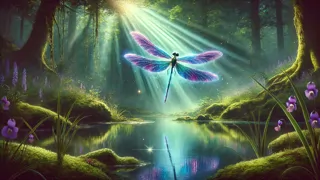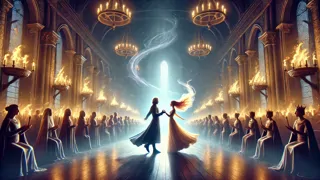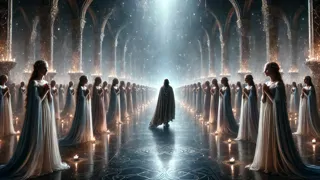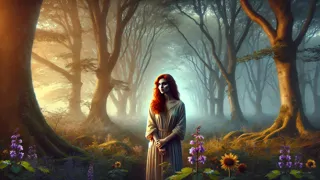Introduction
In the farthest reaches of ancient Ireland, where mists curled around mossy stones and the music of streams danced through emerald woods, there lived a tale older than the language spoken by its people. This is a story not only of love, but of longing that transcends the bonds of time, the envious wrath of immortals, and the fragile beauty of mortal life. At its heart is Etain, a woman whose allure surpassed that of the fairest summer dawn—her presence stirring the deepest desires and the fiercest rivalries among gods and men alike. Born in the luminous halls of the Tuatha Dé Danann, the immortal tribe who walked the hills and meadows before humans ever tilled the soil, Etain was the embodiment of grace and gentle radiance. Yet fate, whimsical and unyielding, would cast her far from the splendors of the gods and into a world defined by suffering, hope, and transformation. Her journey would cross lifetimes and kingdoms, embroiling powerful rulers, shape-shifting sorcerers, and the elemental spirits that whispered through Ireland’s ancient groves. This is not a tale for the faint-hearted or the lovelorn, for it entwines heartbreak with hope, sacrifice with reward, and paints love as both a blessing and a torment. Through every twist of her destiny, Etain remains both goddess and woman, her spirit unbroken even as the world around her shifts like the restless Irish weather. In the valleys where white-thorn blossoms fall, where the wind carries secrets from the Otherworld, Etain’s story lingers—its echoes promising that even in the darkest moments, beauty and love may yet be reborn.
The Enchantment and Exile of Etain
Etain’s birth was a marvel even among the Tuatha Dé Danann, for she seemed woven from sunlight and laughter. Daughter of Ailill, she was cherished for her kind heart and beauty that rivaled the spring dawn. In the immortal courts, her presence stirred both joy and envy. None admired her more deeply than Midir, lord of Brí Léith—a noble among gods, known for wisdom and a longing for the extraordinary. Their love unfolded softly, in secret glades where rivers sang and every leaf seemed to tremble with anticipation. Midir courted Etain with music played on silver harps and whispered words beneath the ancient trees. In time, they wed, their union celebrated with feasts and blessings. But happiness, even among immortals, is seldom without peril. Midir’s first wife, Fuamnach, watched with cold fury as her place in his heart was usurped. A sorceress of great power and bitter pride, she conjured enchantments woven from jealousy and vengeance. Her magic was subtle at first: winds that snatched away Etain’s laughter, shadows that crept into her dreams. When these failed, Fuamnach’s wrath turned fierce. With spells and ancient words, she summoned a storm that lifted Etain from Brí Léith, swirling her away through forests and valleys. For seven years Etain wandered, transformed by Fuamnach’s sorcery into a jewel-bright pool of water, then a dragonfly glimmering above its surface. Seasons passed, and still Etain fluttered from place to place—never resting, never aging, tormented by loneliness as she drifted on every wind. Sometimes she hovered near village fires and heard the laughter of mortals; sometimes she brushed the petals of wildflowers, longing to feel the earth as a woman once more.

But Fuamnach’s magic knew no mercy. In a wild squall, Etain-as-dragonfly was blown into a goblet of mead at the home of Etar, chief of Ulster. There, she was swallowed by Etar’s wife, and so began her passage back into mortal life. Born again as a human child, Etain grew among the people of Ulster, radiant and gentle—her otherworldly grace lingering in her every gesture. She knew nothing of her divine origins, only that she dreamed sometimes of music in the woods and a love that waited beyond memory. Word of her beauty spread like wildfire through Ireland’s courts and clans. Suitors traveled for days to Ulster in hopes of winning her hand. She remained distant, as if listening for a voice only she could hear. Kings sent gifts—jewels and horses, promises of kingdoms—but Etain’s heart was untouched, her gaze always searching the horizon. In those days, mortals whispered that she had the soul of a swan: graceful, elusive, fated for sorrow.
The Mortal King and the Return of Midir
In the kingdom of Tara, high among rolling green hills, ruled Eochaid Airem—a king renowned for his wisdom and hunger for glory. When news of Etain’s beauty reached his court, he felt a yearning unlike any he had known. Determined to win her, Eochaid journeyed to Ulster with a retinue bearing gifts and silver-tongued poets. His arrival was heralded by banners snapping in the wind, musicians filling the air with hopeful songs. Etar welcomed Eochaid’s suit, and Etain—curious and gentle—agreed to meet the king. She found him noble, fair in judgment, and she saw in his eyes a longing for something beyond power. Though her heart echoed with lost dreams, Etain chose to wed Eochaid, believing perhaps that in mortal love she would find peace. Their wedding was a spectacle: feasts lasting seven days, bards composing verses for the ages, all Tara alight with celebration. For a time, Etain knew contentment. She tended the king’s gardens, listened to the river’s song, and watched stars wheel above the hill of Tara. Yet, in quiet moments, she felt a tug within—a sense that her story was unfinished, her heart waiting for something she could not name.

Meanwhile, in the hidden mounds of Brí Léith, Midir mourned. The world of mortals had grown dim to him, but Etain’s memory burned bright. He wandered the Otherworld in sorrow, seeking counsel from druids and wise women, hoping to find a way to reach her. At last, he learned that Etain lived again, but as a mortal queen at Tara. Driven by love that defied the boundaries of death and time, Midir journeyed to Tara disguised as a nobleman. He came not as a rival, but as a challenger in the king’s famous games. Eochaid welcomed all comers to Tara’s halls—chess players, horse racers, men of wit and skill. When Midir asked to play fidchell, the ancient Irish game of kings, Eochaid agreed. The contest lasted deep into the night, Midir matching the king’s every move. At first, they played for sport. But as Midir began to win, he asked for wagers: first gold, then chariots, and finally a boon of his own choosing. Eochaid, proud and confident, agreed. When Midir revealed his prize—one embrace and a single kiss from Etain—the court erupted in outrage. Yet a king’s word was law.
Eochaid was bound by honor to grant Midir his due, but he refused to allow the meeting within his sight. So Midir waited a month and returned to Tara during a great feast. In the torch-lit hall, Etain saw him—a stranger with eyes like a stormy sea, his presence stirring memories long forgotten. Midir spoke words only her heart could understand, and in that instant, the world changed. He drew her into a dance before the assembled nobles. As they spun, wind rushed through the chamber, carrying them aloft—out over the fields and away from Tara. In a blink, they vanished before the astonished king and his court.
Riddles of Identity and the Triumph of Love
The wind carried Etain and Midir far from Tara—over rivers and woods, through veils of mist to the hidden realm of Brí Léith. There, Etain remembered her former life: the music of immortal courts, Midir’s gentle eyes, the echo of love unbroken by time. She wept for all she had lost, but found solace in Midir’s arms once more. For a season they lived in secret happiness, but joy in the Otherworld is never untouched by sorrow. Eochaid, consumed by anger and grief, vowed to reclaim his queen. He gathered druids and wise men, searching for portals into the faerie mounds. Night after night, his men dug at Brí Léith’s earth until at last they broke through to the Otherworld.

Midir, unwilling to see blood spilled, offered Eochaid a challenge: if the king could identify Etain among fifty women—each identical in face and form—he could claim her back. The women appeared before Eochaid, their hair gleaming in the faerie light, each movement echoing Etain’s own grace. Yet only one bore a single tear trailing down her cheek—a silent sign of her sorrow. Eochaid chose her, believing he had won. But fate is seldom so simple. For the woman he claimed was not truly Etain, but a glamour conjured by Midir’s magic. The real Etain remained hidden, her heart torn between two worlds.
In the days that followed, Etain struggled with her identity—was she goddess or mortal? Beloved wife or pawn of fate? Midir, understanding her anguish, offered her freedom: to choose her path, whether with him or among mortals. Etain, her spirit tempered by suffering and longing, made her decision. She would live as both—embracing her mortal life but carrying the Otherworld within her. With Midir’s blessing, she returned to Tara, bearing wisdom gained from her journey. Eochaid welcomed her with open arms, his pride softened by loss. Etain’s presence brought peace to the kingdom; she became a symbol of hope and resilience, a bridge between mortals and immortals.
Though her story was marked by sorrow and longing, Etain’s spirit remained unbroken. She loved with a heart both ancient and new, her memory lingering wherever wildflowers bloomed or the mist rolled in from distant hills. In every generation, the tale of Etain was whispered by firesides—a promise that love, once kindled, could never truly die.
Conclusion
Etain’s story endures because it speaks to the fragile beauty of love and the resilience required to pursue it through trials both magical and mundane. She is more than a goddess caught in the currents of fate; she is every soul who has been exiled from happiness and found their way back, transformed but unbroken. Across Ireland’s hills and hollowed stones, her name is spoken with reverence—a reminder that even when love seems lost or hope withers under sorrow, a new beginning waits, shimmering just beyond the edge of memory. The wind that once carried Etain across kingdoms still stirs the grass on ancient barrows; the rivers sing her name as they wander from mountain to sea. In every heart that dares to love against the odds, Etain’s spirit lives on—reborn with each dawn, proof that destiny is not merely a chain of sorrow, but a circle where beauty and hope are always renewed.

















